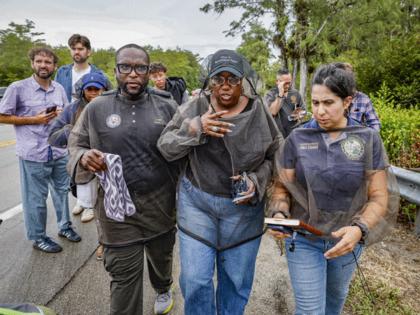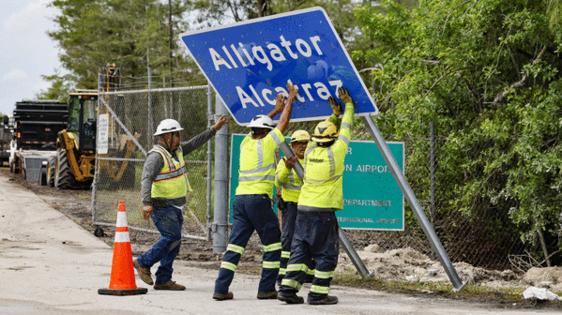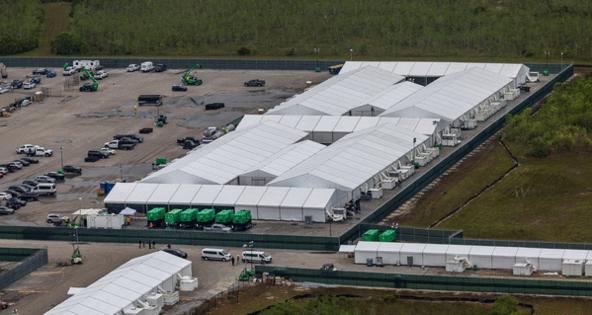Giant bugs, heat and a hospitalization: Inside Alligator Alcatraz's first days
Published in News & Features
The calls from Alligator Alcatraz’s first detainees brought distressing news: Toilets that didn’t flush. Temperatures that went from freezing to sweltering. A hospitalization. Giant bugs. And little or no access to showers or toothbrushes, much less confidential calls with attorneys.
The stories, relayed to the Miami Herald by the wives of detainees housed in Florida’s makeshift detention center for migrants in the Everglades, offer the first snapshots of the conditions inside the newly opened facility, which began accepting detainees on July 2. They reveal detainees who are frightened not just about being deported, but also about how they are being treated by the government, which is saying little about what is taking place inside.
“Why would we treat a human like that?” a woman whose Venezuelan husband is housed in Alligator Alcatraz told the Miami Herald. “They come here for a better life. I don’t understand. We are supposed to be the greatest nation under God, but we forget that we’re under God.”
The men, whose identities the Herald is withholding due to their families’ fears that the government will punish them for speaking out, described harsh conditions at the detention center, pitched as a new model for holding migrants ensnared in President Donald Trump’s war on illegal immigration. The state, which intends to eventually house 3,000 or more people at the site, has said the detainees’ descriptions provided to the Herald are “untrue.”
“Bugs and environmental factors are minimized in the facility, restraints are only utilized during transport outside of the detention centers, and visitation arrangements can be made upon request,” said Stephanie Hartman, a spokeswoman for the state Division of Emergency Management, the state agency overseeing the facility’s operations. “All plumbing systems are working and operational.”
Detainees are telling their families a different story about what it’s like to live in cells inside heavy-duty tents erected on an airstrip in Big Cypress National Preserve.
On Monday afternoon, for instance, word spread quickly across the detention facility that a detainee had suffered a medical emergency. One by one, detainees started calling their family members, relaying different versions of what they believed had taken place.
Outside the detention center, Betty Osceola of the Miccosukee Tribe saw an ambulance leave the facility around 2 p.m. The ambulance headed east toward Miami with its lights on, and later returned to the site, Osceola told the Herald. HCA Florida confirmed that a detainee from Alligator Alcatraz arrived at the Kendall hospital for care on Monday.
“We can confirm,” said Jennifer Guerrieri, assistant vice president of strategic communications for HCA Healthcare’s East Florida Division.
State officials, however, denied there had been a medical emergency on site. A spokesman for Florida Attorney General James Uthemeier told the Herald it was “fake news.”
Conditions inside Alligator Alcatraz
While the state says the stories detainees are sharing with the Herald are false, various scenarios described by three women in separate interviews are matching up.
The women told the Herald that their husbands were unable to shower for several days after arriving. On Sunday, two women said their husbands complained that initially there was no water to flush toilets. All three detainees told their wives that the bugs were getting inside, one of them saying that grasshoppers the size of his hand were springing into the tent and that the biggest mosquitoes he had ever seen were flying over them in their cells.
One detainee sent to Alligator Alcatraz from a Florida jail following a dispute with his ex was bitten on his face by mosquitoes a few times in his sleep, he told his wife on Monday morning. Another detainee, who was arrested for driving without a license three days before arriving at the facility, told his wife he “couldn’t take” the conditions anymore.
A fourth detainee, Cuban reggaeton artist Leamsy Izquierdo, told CBS News and other local media outlets that the lights are on inside the facility 24 hours a day, a detail that was corroborated by a Venezuelan detainee’s wife interviewed by the Herald. Izquierdo was transferred to the Everglades site after landing in Miami-Dade’s Turner Guilford Knight Correction Center on assault and battery charges. He has pleaded not guilty.
Inside the facility, detainees say there are no clocks and there is scant sunlight coming through the heavy-duty tents, making it difficult for them to know whether it is day or night.
The temperature is also a cause of concern for some family members.
A Guatemalan detainee told his wife that he was unable to sleep on Monday night due to how cold it was inside the tent. By Tuesday afternoon, the same man told his wife that it appeared the air-conditioner had stopped working and that it was really hot inside, according to a recording of the conversation obtained by the Herald. His wife told the Herald he was detained while he was a passenger during a traffic stop with Florida Highway Patrol.
The Venezuelan man’s wife heard the same thing on Tuesday afternoon. Her husband said the “air is hot” inside the tent. She said he sounded out of breath.
It was 96 degrees near Alligator Alcatraz Tuesday afternoon, according to National Weather Service data, with a “feels like” temperature of 105 degrees.
“This is not only a humanitarian crisis for detainees, but also for those tasked to staff this facility,” state Rep. Anna Eskamani, D-Orlando, told the Herald after hearing complaints about “horrifying conditions” at the facility related to water, temperatures and hygiene.
Trouble finding their loved ones
Since inviting some members of the press to tour the site prior to the arrival of the first detainees, the state has blocked Eskamani and other lawmakers from entering, ignored the Herald’s request to visit the site and left family members and at least one attorney guessing about how to get in touch with their loved ones and clients.
Katie Blankenship, an attorney and co-founder of Sanctuary of the South, a legal services network, said Tuesday she has been unable to get in touch with a new client whose wife called last week, saying her husband was being transferred to Alligator Alcatraz from the Krome immigration detention center in Miami-Dade County.
Blankenship doesn’t have a number to call him at the facility. His name isn’t showing up in an online website kept by U.S. Immigration and Customs Enforcement. She has asked ICE officials to confirm his whereabouts, but she said her emails have gone unanswered and the wife hasn’t heard from her husband since he was transferred.
“I think it’s a gross, gross violation of due process to put people literally in this black hole where they cannot be found,” Blankenship said in an interview. “They cannot speak with counsel, they cannot contact immigration court. They are just for all intents and purposes disappeared.”
When detainees call their loved ones, their conversations are recorded. The state has yet to provide them with a way to call their legal counsel through a secure line, said one of the women interviewed by the Herald.
According to a draft operational plan obtained by the Herald outlining the “minimum requirements” for the facility, immigrant detainees should have the ability to “confidentially contact several legal entities at no cost, or in the alternative, allow for these free calls through some other means.”
The draft proposal states that “the facility shall ensure the privacy to ICE detainees’ legal calls with attorneys, legal services providers, and consular officials.” Records also state that “the facility shall notify ICE detainees of the proper procedures to have unmonitored legal calls.”
Hartman did not respond when asked Tuesday morning if the state had provided a confidential line for detainees.
It’s unclear if detained migrants at Alligator Alcatraz are under the custody of ICE or the state, and how they will have access to a judge. According to a court filing on Tuesday in a lawsuit related to environmental concerns, legal counsel for Homeland Security Secretary Kristi Noem and Todd Lyons, the acting director of ICE, said any decision to hold immigrant detainees at Alligator Alcatraz would be up to Florida, not DHS.
“We don’t know what entity to call. Who is in charge out there? I don’t think anybody actually knows who is in charge,” Blankenship said.
The Venezuelan man’s wife told the Herald she spent days desperately looking for the facility’s phone number in hopes of being able to connect her husband with his immigration attorney. She can’t find a website with any of the information online. When she calls the number he calls from, the line directs her to an automotive message from a third-party company. On Tuesday she found an email.
Hartman, the state agency spokeswoman, did not immediately respond when asked how family members and attorneys could request visitations.
On Tuesday, Miami-Dade County Mayor Daniella Levine Cava, whose government owns the site, wrote letters to the state and federal governments demanding more transparency.
Writing to Noem, Levine Cava said Alligator Alcatraz is located in an isolated area “with poor access to hospitals and legal counsel.” Levine Cava also requested in a letter to Uthmeier weekly reports on conditions at the site, remote video monitoring and the ability to send a team to conduct site visits.
“Families and advocates are being shut out, and the public is left in the dark,” the Democratic mayor wrote.
DHS and ICE did not immediately respond to a request seeking comment on Levine Cava’s letter.
The wife of the Guatemalan detainee said she was trying to get an immigration attorney to represent her husband, but that she was having trouble finding someone to take the case because of the lack of information regarding his whereabouts.
When a reporter asked her what she plans to do, she paused.
“Wait,” she said. “There is nothing else to do, not even the attorneys can do anything.”
_____
(Miami Herald reporters Grethel Aguila and David J. Neal contributed to this report.)
_____
©2025 Miami Herald. Visit at miamiherald.com. Distributed by Tribune Content Agency, LLC.












Comments